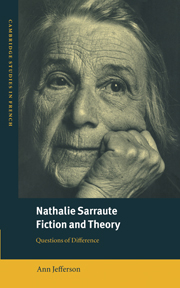Book contents
- Frontmatter
- Contents
- Acknowledgements
- List of abbreviations
- Introduction
- Part I DIFFERENCE AND HUMAN RELATIONS
- Part II THE BODY AND SEXUAL DIFFERENCE
- Part III GENRE AND DIFFERENCE
- Chapter Six Criticism and ‘the terrible desire to establish contact’
- Chapter Seven Same difference: reprise and variation
- Part IV CONCLUSION
- Notes
- Bibliography
- Index
- CAMBRIDGE STUDIES IN FRENCH
Chapter Six - Criticism and ‘the terrible desire to establish contact’
Published online by Cambridge University Press: 22 September 2009
- Frontmatter
- Contents
- Acknowledgements
- List of abbreviations
- Introduction
- Part I DIFFERENCE AND HUMAN RELATIONS
- Part II THE BODY AND SEXUAL DIFFERENCE
- Part III GENRE AND DIFFERENCE
- Chapter Six Criticism and ‘the terrible desire to establish contact’
- Chapter Seven Same difference: reprise and variation
- Part IV CONCLUSION
- Notes
- Bibliography
- Index
- CAMBRIDGE STUDIES IN FRENCH
Summary
GENERIC DIFFERENCES
Unlike a number of her contemporaries, Nathalie Sarraute always seems happy to accept inherited generic distinctions. Rather than seek to challenge or blur generic categories in favour of some general, generically undifferentiated écriture (in the manner of Blanchot, Barthes or Sollers, for example), she concentrates her energies instead on redefining the concepts and assumptions contained within those divisions. Most particularly – by means both of her own fictional practice and of her critical essays – she makes herself the champion of a modernised conception of the novel. Where others (beginning with Sartre in his Preface to Portrait d'un inconnu) had recourse to the notion of the ‘antinovel’, Sarraute always insists that definitions of fiction may need to be rethought, but that they should certainly not be abolished. ‘[Portrait d'un inconnu] n'est pas un “anti-roman”, les autres non plus,’ she says in an interview in response to a question about Sartre's use of the term ‘antiroman’. ‘[Sartre] avait une idée préconçue de ce que devait être une forme romanesque, alors qu'il s'agit seulement de faire bouger cette forme. J'écris des romans modernes, c'est tout’ [‘[Portrait d'un inconnu] is not an “anti-novel”, nor are the others. […] [Sartre] had a preconceived idea about what fictional form should consist of, whereas the point is simply to move this form on. I write modern novels, that's all’].
- Type
- Chapter
- Information
- Nathalie Sarraute, Fiction and TheoryQuestions of Difference, pp. 119 - 144Publisher: Cambridge University PressPrint publication year: 2000



